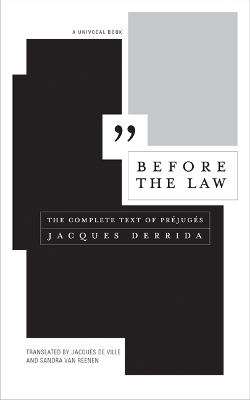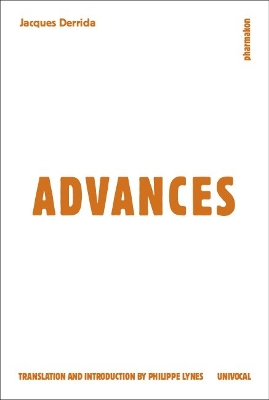Univocal
2 total works
Thinking judgment in relation to the work of Jean-François Lyotard
“How to judge—Jean-François Lyotard?” It is from this initial question that one of France’s most heralded philosophers of the twentieth century begins his essay on the origin of the law, of judgment, and the work of his colleague Jean-François Lyotard. If Jacques Derrida begins with the term préjugés, it is in part because of its impossibility to be rendered properly in other languages and also contain all its meanings: to pre-judge, to judge before judging, to hold prejudices, to know “how to judge,” and more still, to be already prejudged oneself.
Striving to contain that which comes before the law, that is in front of the law and also prior to it, how to judge Jean-François Lyotard then becomes perhaps a beneficial attempt for Derrida to explore humanity’s rapport with judgment, origins, and naming. For how does one come to judge the author of the Differend? How does one abstain from judgment to accept the term préjugés as suspending judgment and at once as taking into account the impossibility of speaking before the law, prior to naming or judging? If this task indeed seems insurmountable, it is the site where Lyotard’s work itself is played out. Hence this sincere and intriguing essay presented by Jacques Derrida, published here for the first time in English.
Originally published in 1995, Advances was first written by Jacques Derrida as a long foreword to a book by one of his most promising former students, the philosopher Serge Margel’s Le Tombeau du Dieu Artisan (The Tomb of the Craftsman). What Derrida uncovers for us is Margel’s own unique theory of the promise in relation to an an-archic, pre-chronological temporality, in conjunction with Margel’s radical rereading of Plato’s Timaeus. As Derrida states right away, Margel’s reading is a new one, a new reading of the Demiurge. A new promise. A new advance.
In this magisterial late essay by Derrida, what the reader soon discovers is in part a conversation with his former student, as well as an opening for a new reflection on our current ecological and political crises that are all the more urgent today where the possibility of giving ourselves death as a human race and the end of the world is now, within an era of climate change, more real than ever.
As part of Univocal’s Pharmakon series, this essay, itself published in advance, becomes a brief but powerful light pointing toward Univocal’s forthcoming publication of the translation of Serge Margel’s Le Tombeau du Dieu Artisan. “Once again the Timaeus, of course, but a different Timaeus, a new Demiurge, I promise.”

